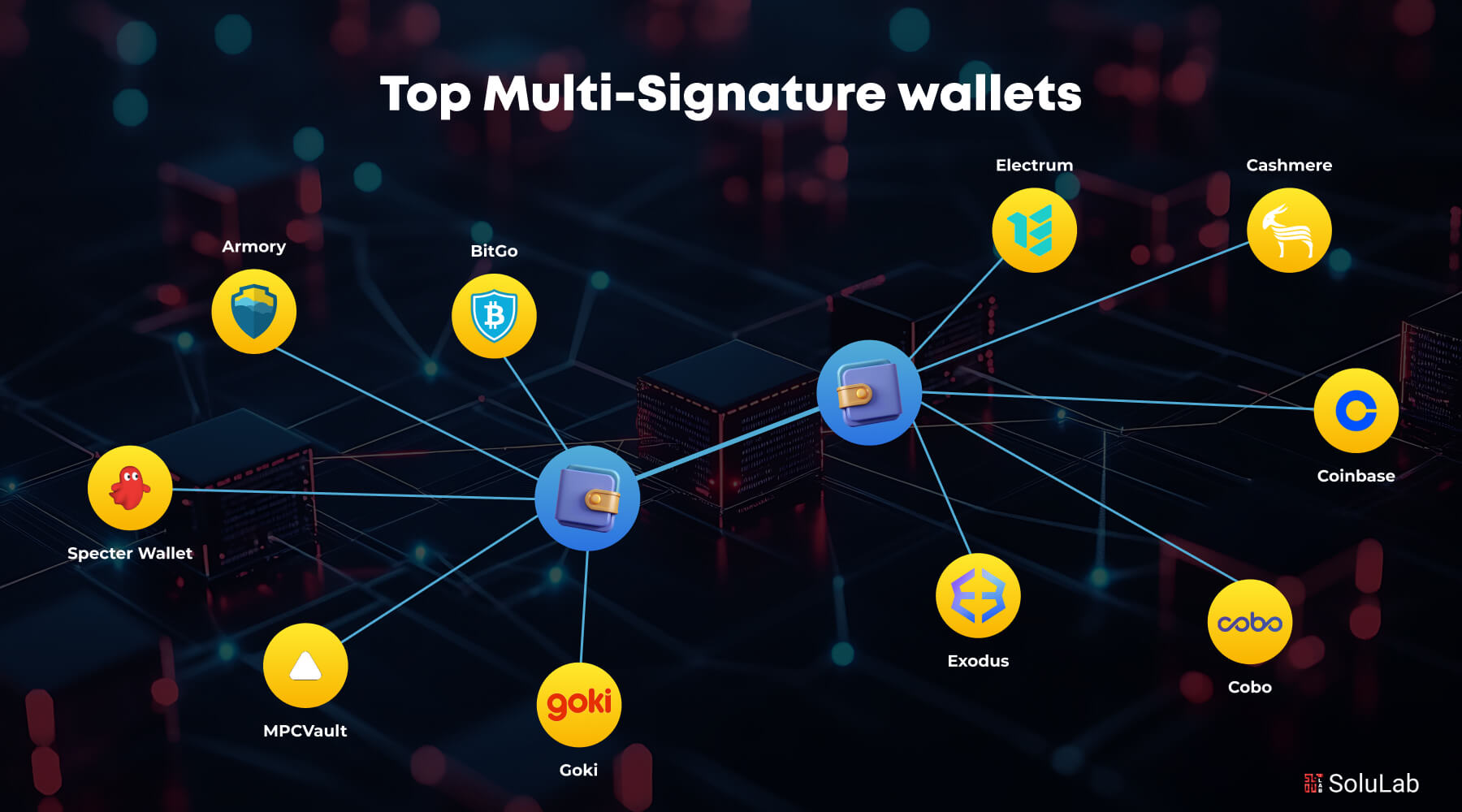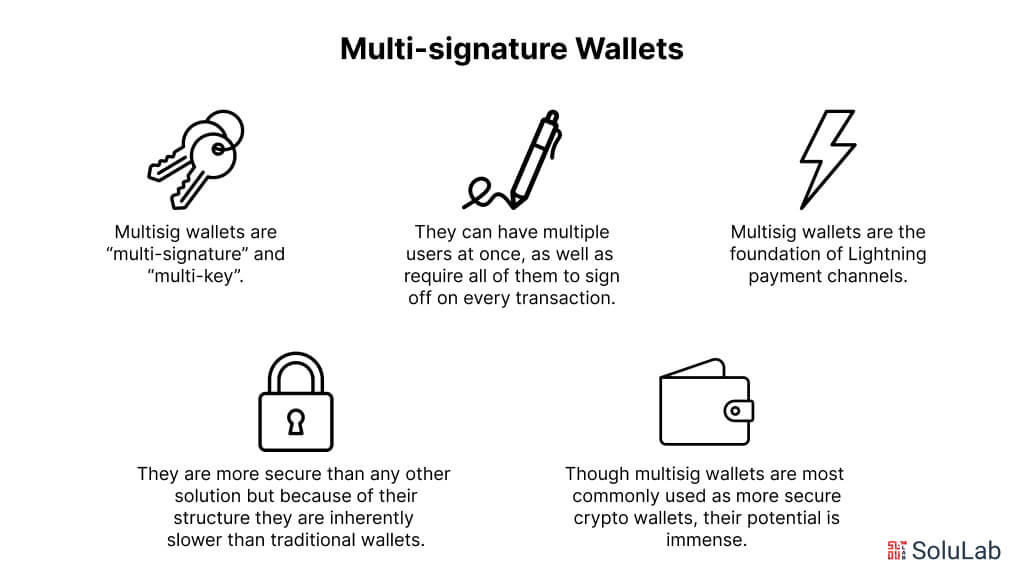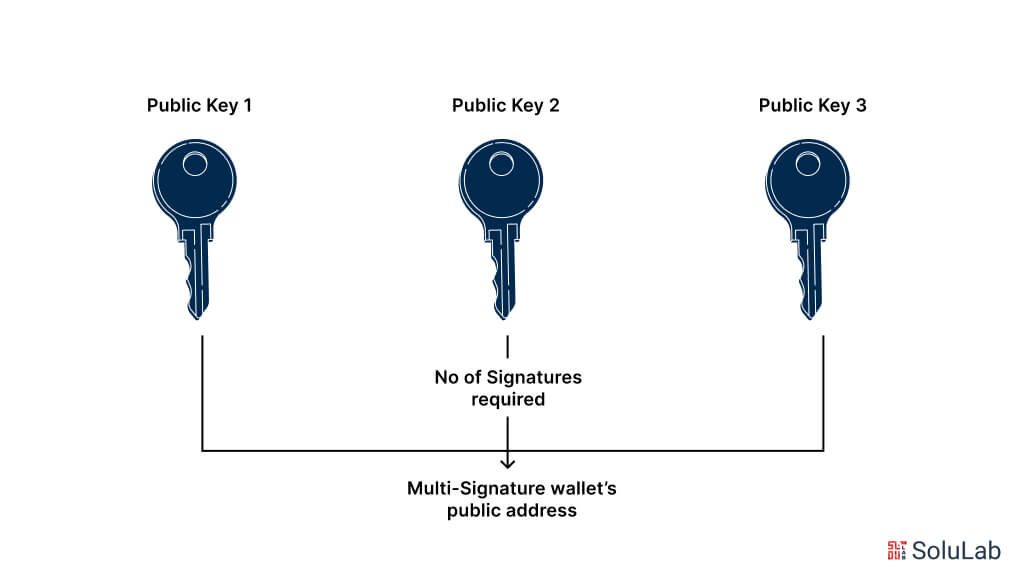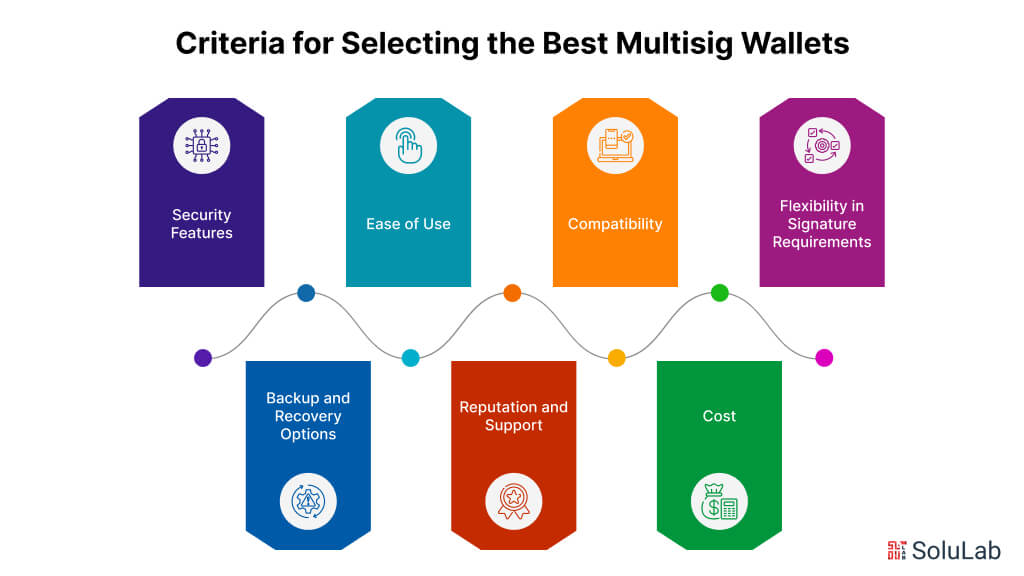
In 2025, the importance of secure digital asset management has never been greater, particularly as the use of cryptocurrencies continues to expand. Multisig wallets, known for their enhanced security features, have become essential tools for individuals and organizations looking to safeguard their assets. By requiring multiple private keys for transaction approval, these wallets offer additional protection against unauthorized access, making them a preferred choice for many.
In 2023 alone, approximately $3.8 billion worth of cryptocurrency was stolen through various cyberattacks, with a significant portion attributed to single-signature wallet vulnerabilities. Multisig wallets have proven to be an effective deterrent, reducing the risk of unauthorized access by over 60%.
In this blog, we will highlight the top 10 multisig wallets of 2025, carefully selected based on their security, user experience, and feature set. Whether you’re a crypto enthusiast, a business, or a developer, understanding the capabilities of these wallets will help you make informed decisions about protecting your digital assets. But first, let’s look into what multisig wallets are all about!
What is a Multisig Wallet?

A multi-signature (multisig) wallet represents an advancement in cryptocurrency wallet architecture, adding an additional layer of security by requiring multiple private key holders to authorize and execute transactions. Unlike the conventional single-signature wallet model, which needs only one private key for transaction approval, the best multisig wallets are designed to require the consensus of multiple co-signers before a transaction can be finalized.
Beyond just security enhancements, multi-signature wallets offer several practical advantages. They facilitate the management of shared funds from a unified platform, making them particularly useful for entities such as organizations, joint accounts, and family setups, where multiple stakeholders may need to oversee transactions. This structure ensures transparent and accountable decision-making processes, as transactions must be approved by several parties, making multi-signature wallets valuable for democratic and consent-driven decision-making.
A multi signature wallet, often referred to as a multi-signature wallet, is a specialized type of cryptocurrency wallet designed to enhance transaction security by requiring multiple signatures before a transaction can be executed. In a multi signature wallet setup, a certain number of private keys are generated, typically distributed among various parties or entities. For instance, in a 2-of-3 multisignature configuration, three private keys are created, and any two of them must be used to authorize a transaction.
Transactions initiated from a multi-signature wallet cannot proceed until the required number of signatures is provided. Each authorized signer has their key and must approve the transaction for it to be finalized. This feature is crucial in protecting against unauthorized access or fraudulent transactions, as it would require the collusion of multiple parties to compromise the wallet’s security.
One of the many benefits of the best multisig wallets is the flexibility to configure the number of required authorizations. Depending on the desired balance between security and convenience, top multisig wallets can be set up with various signature combinations, such as 1-of-2, 2-of-3, or 3-of-5, among other configurations. This adaptability allows users to tailor the security settings according to their specific needs, helping to strike a balance between stringent security and ease of access.
Additionally, multi signature wallets often come with other features that enhance their effectiveness and reliability. For example, recovery procedures can be implemented, enabling authorized users to regain access if a private key is lost or becomes inaccessible. This added layer of security helps prevent wallets from being locked due to accidents or emergencies, providing peace of mind to users.
Why Multi-Signature Wallets are Important?
Among the numerous security advancements in the world of cryptocurrency and digital assets, Multi-signature (multi-sig) wallets stand out as a significant leap forward, offering a robust level of security that remains fully under the user’s control. Unlike traditional wallets that rely on a single private key for transaction authorization, multisignature wallets require multiple distinct private keys to approve a transaction. This approach decentralizes the authorization process, addressing risks such as lost or compromised keys, unauthorized access, and theft, thereby eliminating single points of failure.
The importance of multi signature wallets lies in their ability to enhance the security of cryptocurrency holdings, especially in scenarios involving large assets or multiple co-owners. For example, in business environments, an owner might allocate a multi-signature wallet to various personnel within the organization, requiring approval from multiple authorized individuals before any funds can be spent. This setup is also beneficial in partnerships involving joint investments or collaborative projects, where multi signature wallets ensure that all transfers or withdrawals occur only with unanimous agreement from all decision-makers, promoting transparent and unified decision-making processes in managing AI cryptocurrency coins.
Moreover, multisig wallets offer a practical solution for secure escrow services, where funds are held until predefined conditions are met. In such cases, the multi signature model prevents any party from accessing the funds independently until all parties agree, significantly reducing the risk of fraud or disputes.
Beyond enhancing security, the use of multi-signature wallets contributes to the broader goals of decentralization and user confidence within the cryptocurrency ecosystem. By distributing responsibility across multiple parties, multisignature wallets align with the decentralized nature of blockchain technology, dispersing control rather than concentrating it in the hands of a single entity. This innovative approach not only strengthens security but also builds greater resilience against potential cyber-attacks or system failures.
Multi-Signature Wallet Address Concept
We’ve explored the basic functioning of a Multi-Signature wallet, but questions often arise regarding addresses, such as where to send funds for multisig wallets or how a signature is executed.
Let’s start by defining three key terms:
- Public Key: A public key is a cryptographic code that allows users to receive cryptocurrencies into their accounts.
- Private Key: As previously discussed, a private key is used to send funds and verify transactions, making it essential to keep it secure.
- Public Address: This is a hashed version of a public key. When a user wishes to receive funds, they share their public address with the other party.
Now, imagine we’re setting up a Multi-Signature wallet with three addresses. Each of these addresses will have its own public key, private key, and public address.
- Address 1: Public Key 1, Private Key 1, Public Address 1
- Address 2: Public Key 2, Private Key 2, Public Address 2
- Address 3: Public Key 3, Private Key 3, Public Address 3
To generate the public address of a multi-signature wallet, we need to provide the public keys from all three addresses (Public Key 1, Public Key 2, and Public Key 3) as input. Additionally, we must define the number of signatures required to approve a transaction—let’s say, in this case, two signatures are needed.

The Public Address of the Multi-Signature Wallet
This process will generate a single public address for the multi-signature wallet, which can be shared with the sender. All funds will be received at this address. Along with the public address, a Redeem Script is also generated. This script must be saved and shared with all participants before any payment is made to verify the authenticity of the address.
With this understanding, we now know how the addresses for multisig wallets, including the top 10 multisig wallets in 2025, are generated.
Multi-Signature Wallet Transaction Signing
Continuing with the scenario above, let’s say Address-1 initiates a transaction using the multi-signature wallet to send 10 BTC to another address. First, Address-1 signs the transaction using its private key (Private Key 1). However, to complete the transaction, one more signature is needed. Address-1 then shares the signed transaction with both Address-2 and Address-3. Either one of them can sign the transaction. Once the second signature is provided, as required, the transaction is processed successfully.
Criteria for Selecting the Best Multisig Wallets

When choosing among the top 10 multisig wallets, several crucial factors should guide your decision to ensure you select the most secure and efficient option for your needs. Here are the key criteria to consider when evaluating multi-signature wallets:
1. Security Features: The primary purpose of a multi-signature wallet is to enhance security. Look for multi signature wallets that offer strong encryption protocols, two-factor authentication, and protection against unauthorized access. A well-designed wallet should provide multiple layers of security to safeguard your assets.
2. Ease of Use: While security is critical, the wallet should also be user-friendly. The best multisig wallets strike a balance between advanced security features and an intuitive interface. Ensure the wallet you choose is easy to set up and manage, even for those who may not be tech-savvy.
3. Compatibility: Check whether the multi-signature wallet is compatible with the cryptocurrencies you intend to store. Additionally, consider its compatibility with different operating systems and devices. A versatile wallet that supports various platforms will be more convenient for day-to-day use.
4. Flexibility in Signature Requirements: Different scenarios may require varying levels of authorization. The top multisig wallets should offer flexibility in setting up the number of required signatures, such as 2-of-3 or 3-of-5 configurations. This adaptability allows you to customize the security level according to your specific needs.
5. Backup and Recovery Options: In the event of a lost or compromised key, it’s essential to have a reliable backup and recovery process. Choose a multi-signature wallet that provides secure recovery options, ensuring you can regain access to your funds without compromising security.
6. Reputation and Support: The reputation of the wallet provider is another critical factor. Opt for multi signature wallets from providers with a strong track record of security and reliability. Additionally, ensure that customer support is available to assist with any issues that may arise.
7. Cost: While some multi-signature wallets are free, others may charge fees for certain features or transactions. Consider the cost of using the wallet, and weigh it against the security and convenience it offers to determine if it provides good value.
By carefully considering these criteria, you can select a multi signature wallet that not only meets your security needs but also offers the ease of use and flexibility required for managing your cryptocurrency assets effectively.
Read Also: How to Create a Wallet like Phantom?
Here are the top 10 multisig wallets in 2025:
1. Electrum
Electrum is a well-established name in the cryptocurrency wallet arena, boasting a rich history since its inception in 2011. Its enduring popularity stems from a variety of key features that have made it a go-to choice for Bitcoin holders worldwide. Electrum is celebrated for its simplicity, which does not compromise security, making it appealing to both novice and experienced users.
Unlike some competitors, Electrum embraces decentralization by allowing users to connect to multiple servers simultaneously, ensuring both robustness and resilience against network disruptions. This decentralized approach not only enhances reliability but also aligns with the core principles of cryptocurrencies, making it an ideal choice for an accounting platform with crypto assets.
Security remains paramount in the digital assets space, and Electrum addresses this through a unique serial number assigned to each wallet, offering security through various features and functionalities. For instance, it supports cold storage, where private keys are kept offline and out of reach from potential online attacks. Additionally, Electrum is fully compatible with hardware wallets, providing convenient two-factor authentication for users aiming to secure their funds. This emphasis on security has solidified Electrum’s reputation as a trusted exchange, earning it a strong foothold in the digital finance world.
2. Cashmere
Cashmere Multisig is a protocol designed to ensure top-tier security for cryptocurrency transactions, particularly within decentralized finance (DeFi). The Cashmere Multisig feature adds an extra layer of protection to users’ digital assets by requiring a specific number of signatures from authorized individuals before a transaction is validated.
These authorized signatories are typically the asset owners or entities such as banks, trustees, or security agents. By distributing control among multiple parties, Cashmere Multisig significantly reduces the risk of unauthorized access, fraud, or theft.
A major advantage of Cashmere Multisig is its flexibility, allowing users to continually update and customize their settings to better serve their needs. Users can select the number of required signatures and designate specific individuals as signatories, addressing privacy and security concerns. The protocol’s versatility extends to various use cases, from personal crypto wallets to institutional funds and decentralized autonomous organizations (DAOs). Moreover, Cashmere Multisig can be paired with additional security measures like hardware wallets, biometric authentication, or time locks, creating a robust security framework that protects digital assets against sophisticated attacks and human errors.
3. Coinbase
Coinbase is a cornerstone in the world of cryptocurrency exchanges, having been established in 2012 by Brian Armstrong and Fred Ehrsam. Over the years, Coinbase has grown into a leading name in digital currencies, renowned for its user-friendly interface, strong security measures, and adherence to regulatory standards. The platform’s growth has paralleled the global rise in cryptocurrency awareness and adoption.
Primarily functioning as a digital currency wallet and trading platform, Coinbase enables users to buy and sell cryptocurrencies like Bitcoin, Ethereum, Litecoin, and a wide range of altcoins.
Its intuitive interface has made it the preferred choice for both beginners dipping their toes into the crypto market and seasoned traders seeking a secure and reliable platform for transactions. By focusing on accessibility and ease of use, Coinbase has played a pivotal role in democratizing cryptocurrencies and making them more accessible to the general public.
4. Cobo
Cobo has established itself as a prominent player in the cryptocurrency space, offering a comprehensive suite of products and services tailored to both individual users and corporate clients. Founded in 2017, Cobo is known for its innovative solutions in the cryptocurrency domain, with a strong commitment to security. Central to its offerings is a multi-currency wallet that allows users to securely store, manage, and trade a wide array of cryptocurrencies, all within a user-friendly interface that caters to both novice and experienced investors.
Beyond its popular wallet service, Cobo has expanded its portfolio with advanced features that allow users to maximize the potential of digital currencies. These include a staking feature that lets users benefit from blockchain technologies by participating in network security and earning rewards.
Additionally, Cobo offers master node hosting solutions, enabling users to participate in the operation and governance of various blockchain networks and earn rewards for their involvement. These unique features not only provide users with passive income opportunities but also align with the broader goals of decentralization, security in the crypto world, and data annotation, ensuring accuracy and transparency in blockchain operations.
5. Exodus
Exodus Multisig is a key feature of the Exodus wallet, known for its user-friendly interface and extensive support for digital assets. This functionality allows users to create multi-signature wallets that require multiple private keys before a transaction can be executed. This setup ensures that no single individual can access or transfer the funds stored in a multisig wallet, thereby enhancing security and reducing the risk of hacking or loss.
Exodus Multisig stands out for its simplicity and ease of use, addressing the traditional complexity associated with setting up and managing multi-signature wallets. With Exodus, users can manage their multisig wallets directly from the wallet’s intuitive interface, making it accessible even to those without extensive technical knowledge of cryptocurrency security.
Moreover, the Multisig feature is compatible with a wide range of cryptocurrencies supported by Exodus, including Bitcoin, Ethereum, and Litecoin. This flexibility in setting multisig parameters ensures that users can securely store and manage their digital assets, enhancing the overall security of their holdings.
6. Goki
Goki has emerged as a premium service tailored for decentralized finance (DeFi) users who seek a secure and reliable platform for managing their cryptocurrency assets through multi-signature technology.
Goki’s unique treasury system employs multiple private keys for signing transactions, providing an added layer of security against unauthorized access and theft. By distributing control geographically among various parties, Goki addresses the single point of failure issue common in traditional custodial solutions.
One of Goki’s standout features is its use of secret-sharing cryptography. This allows users to customize the level of control over their funds, offering maximum flexibility in managing their assets. From a basic two-of-three signature setup to more complex configurations involving multiple participants, Goki caters to a wide range of user needs within the DeFi Ecosystem.
7. MPCVault
MPCVault is a leading cryptocurrency and digital asset management platform designed to meet the complex security needs of its users. The platform utilizes an innovative approach known as multi-party computation (MPC), a cryptographic method that enhances security while maintaining accessibility.
Unlike traditional storage solutions like hardware wallets or centralized exchanges, which rely on a single entity, MPCVault decentralizes trust by distributing it across an interdependent network of nodes. This decentralization significantly reduces the risk of a single point of failure, making MPCVault a robust solution for secure asset management.
MPCVault prioritizes both security and usability. Its user-friendly design and ability to synchronize with multiple cryptocurrency networks allow investors to manage their digital currencies on a single platform effortlessly. MPCVault serves as a multi-purpose platform, enabling users to store, transfer, and exchange various cryptocurrencies, including Bitcoin, Ethereum, and a wide range of altcoins. This interconnectedness not only enhances asset management but also facilitates interaction with decentralized applications (dApps) and smart contracts, expanding opportunities within the blockchain ecosystem.
8. Specter Wallet
Specter Wallet is another highly regarded option for those looking to secure their digital assets through multi signature technology. Designed with a focus on Bitcoin, Specter Wallet offers a range of features that cater to both individual users and organizations.
One of its key strengths is its integration with hardware wallets, which allows users to sign transactions securely with devices like Trezor, Ledger, and Coldcard. This integration enhances security by keeping private keys offline, reducing the risk of online attacks.
Specter Wallet also emphasizes privacy and decentralization. It allows users to run their own Bitcoin node, ensuring that they retain full control over their funds and transactions. This approach aligns with the ethos of Bitcoin, providing a high level of autonomy and security. Additionally, Specter Wallet supports multi-signature setups, enabling users to require multiple signatures for transactions, thereby enhancing security.
9. Armory
Armory is a well-known name in the world of Bitcoin wallets, particularly for users who prioritize security. As a Bitcoin-only wallet, Armory is designed to provide advanced security features, making it a popular choice among users who require robust protection for their digital assets.
One of its key features is its support for multi-signature wallets, allowing users to set up complex security protocols that require multiple signatures to authorize transactions. Armory is also known for its offline transaction support, which is crucial for users who want to protect their private keys from online threats. By keeping private keys offline and only connecting to the internet when necessary, Armory minimizes the risk of hacking and other forms of cyberattacks.
The wallet’s interface, while more suited to advanced users, offers powerful tools for managing Bitcoin securely. Armory’s focus on security, combined with its advanced features, makes it a top choice for users who need a highly secure environment for their Bitcoin transactions.
10. BitGo
BitGo is a leading provider of security solutions for digital assets, particularly in the realm of multi-signature technology. Founded in 2013, BitGo has established itself as a trusted platform for securing and managing large volumes of cryptocurrency.
It offers a multi-signature wallet solution that requires multiple keys to authorize transactions, providing an additional layer of security against unauthorized access.
BitGo’s services are tailored to meet the needs of both individual users and institutional clients. Its platform supports a wide range of cryptocurrencies, making it a versatile choice for users with diverse portfolios. Additionally, BitGo offers insurance coverage for digital assets, providing an extra layer of protection in the event of a security breach. The platform’s user interface is designed to be both secure and user-friendly, allowing users to manage their assets with confidence. BitGo’s reputation for security, combined with its comprehensive suite of services, makes it a top contender among the best multisig wallets in 2025.
How Can SoluLab Help You Develop Custom Multisig Wallets?
Multisig wallets have emerged as a vital tool in the cryptocurrency space, offering enhanced security and control over digital assets. By requiring multiple signatures to authorize transactions, these wallets significantly reduce the risks associated with single points of failure, unauthorized access, and fraud. Whether you’re an individual seeking to protect your personal assets or a business looking to secure corporate funds, choosing the right multisig wallet is crucial. With various options available, it’s important to consider factors like security features, ease of use, supported cryptocurrencies, and compatibility with other platforms to find a wallet that meets your specific needs.
At SoluLab, we specialize in developing custom multisig wallets and other crypto wallet solutions tailored to your requirements. Our expertise in blockchain technology allows us to create secure, user-friendly, and scalable wallets for a wide range of applications. A prime example of our work is NovaPay Nexus, a self-hosted and automated cryptocurrency payment processor. NovaPay Nexus enables businesses to accept payments in Bitcoin and other digital currencies directly, without any fees, transaction costs, or intermediaries. This platform goes beyond payment processing by allowing you to build your cryptocurrency ecosystem, offering innovative solutions like loyalty programs, donation platforms, and crowdfunding campaigns. With SoluLab’s advanced development capabilities, we empower you to make use of cryptocurrencies, ensuring a seamless and secure experience for your users.
FAQs
1. What is a multisig wallet, and why should I use one?
A multisig (multi-signature) wallet is a type of cryptocurrency wallet that requires multiple private keys to authorize a transaction. This means that instead of relying on a single key (and a single point of failure), a transaction must be approved by a set number of participants. This added layer of security makes multisig wallets ideal for businesses, organizations, or individuals who want to protect their digital assets from unauthorized access or fraud.
2. How does a multisig wallet improve security?
A multisig wallet improves security by distributing control over a wallet across multiple participants. For example, if a multisig wallet requires two out of three signatures to authorize a transaction, even if one private key is compromised, the funds remain secure as the attacker would still need access to one more key. This reduces the risk of loss due to hacking, phishing, or other types of attacks that typically exploit a single point of failure.
3. Can I use a multisig wallet for any cryptocurrency?
Most multisig wallets support popular cryptocurrencies like Bitcoin and Ethereum, but compatibility can vary depending on the wallet. Some multisig wallets are designed specifically for certain cryptocurrencies, while others support a broader range of digital assets. It’s important to choose a multisig wallet that supports the specific cryptocurrencies you plan to use.
4. How do I choose the right multisig wallet for my needs?
To choose the right multisig wallet, consider factors like the level of security required, the ease of use, the number of supported cryptocurrencies, and the wallet’s compatibility with other platforms and devices. Additionally, think about your specific needs—whether you’re an individual looking to secure personal assets or a business managing corporate funds. Reviewing the top 10 multisig wallets can also provide insight into which features might be most beneficial for your situation.
5. How can SoluLab help in developing a custom multisig wallet?
SoluLab offers specialized services in developing custom multisig wallets tailored to your specific needs. Our team has extensive experience in blockchain technology and can create secure, user-friendly, and scalable wallets for a variety of applications. With SoluLab’s expertise, you can create a secure and efficient cryptocurrency ecosystem for your users.





